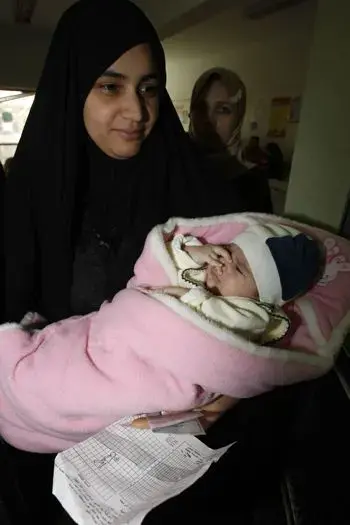Iraq has been subjected to some of the most complex emergencies, conflict and security situations in the world today. Over the last seven years the stable Iraq societies witnessed the makings of internal separations and conflict as a result of unmet popular expectations.
Health facilities have sustained serious damage and are in need of urgent rehabilitation. PHC centers have “deteriorated” due to lack of maintenance, lack of supplies, reduced or inadequate health workers or inadequate support services.
Fertility: Fertility is significantly high in Iraq (the second highest rate in the Arab world), combined with weak reproductive health/family planning services and the prevailing poverty, still hinder improved maternal and women’s health in Iraq.
Maternal mortality: The available estimates place Iraq among the 68 countries that account for 97% of maternal and child deaths. The main causes behind this high rate are: Poor birth practices, inadequate referral or availability of emergency obstetric care and high level of anemia among pregnant women (35%), which particularly affect rural women and those in the Centre and South Regions.
Women’s rights: Lack of investment in women’s capacity underlies the prevalence of illiteracy, poverty and gender-based violence (GBV). Despite Iraq’s successful fulfillment of its constitutional mandate allotting 25% of parliamentary seats to women, women remain underrepresented in the higher levels of the public sector and government, face higher illiteracy levels, and participate in small numbers in the labour force.
Youth: The Iraqi youth are the most vulnerable among the population to general and reproductive health risks, comparatively large proportions of the female youth get married at early ages, a risk factor predisposing them to ill-reproductive health behaviors and outcomes and an underlying force for propelling girls out of secondary and tertiary education. Moreover, women and youth often do not access information and services due to fear of discrimination or stigma, which can affect access to health and promotional services.
Nutrition: The health and nutrition status of the Iraqis, including the young people, has influenced by inadequate quality health services, and poor accessibility to better nutrients, safe-drinking water, and improved sewage system and personal hygiene.
Collectively, these constraining factors are premised to lead to high risk of morbidity, disability and mortality among the youth.
Despite the difficult situation in Iraq, UNFPA Iraq is assisting the MoH to enhance the main MoH priorities which includes the implementation of the maternal child health and reproductive health strategies and that by setting up a four years Action Plan (2011-2014) for RH which includes:
-
Enhancing efficiency of primary health care and referral systems to offer a comprehensive reproductive health package.
-
Increasing utilization of women and youth, in underserved areas, of gender- and age-sensitive RH/FP and other psycho-social services.
The National Development Plan (2010 – 2014), as well as the National Health Policy advocate for a Primary Health Care approach as an effective and equitable means of providing basic health services for all, and particularly for women, children and youth, and to complement the existing hospital-based system, with a balanced preventive and curative approach. Within this context, and to advance achievement of ICPD goals and MDG 5, the “Reproductive & Maternal Health” component aims to respond to Iraq’s challenges to advance Reproductive Health and Rights, particularly for mothers and women in a life cycle approach, with emphasis on Family planning and Emergency Obstetric Care.
More precisely, through its different and interactive outputs and interventions, the programme components aiming at contributing to two main outcomes:
-
Strengthening access and effective integration of a comprehensive package of client-oriented & quality Reproductive Health (RH) services into Iraqi health systems at national and sub national levels, with particular focus on Primary Health Care system, with adequate referral to Hospital system;
-
Increasing demand and utilization of RH services by women and youth, particularly in underserved areas, through community-based behavior change interventions targeting individuals and communities.
National Partners (at Federal and Kurdistan Regional Government)
-
Ministry of Health, NGOs, CSOs (such as professional syndicates, ……..), Parliament committees,
-
Academia, and University Research Centers
UN Partners:
WHO, UNICEF, WFP


